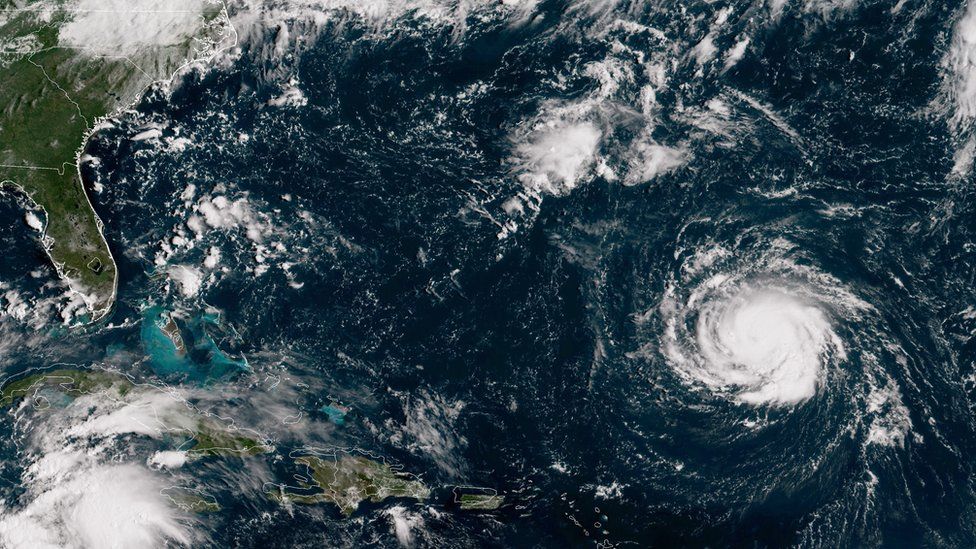Nuclear weapons and hurricanes don't mix, NOAA advises
- Published

Using nuclear weapons to destroy hurricanes is not a good idea, a US scientific agency has said, following reports that President Donald Trump wanted to explore the option.
The Axios news website said Mr Trump had asked several national security officials about the possibility.
The National Oceanic and Atmospheric Administration (NOAA) said the results would be "devastating".
Mr Trump has denied making the suggestion.
Hurricanes typically affect the US east coast, often causing serious damage.
It's not the first time the idea has been considered.
Following reports of Mr Trump's suggestion, the hashtag #ThatsHowTheApocalyseStarted has been trending on Twitter.
What effect would nuking a hurricane have?
Mr Trump asked why the US couldn't drop a bomb into the eye of the storm to stop it from making landfall, news site Axios said.
The NOAA says that using nuclear weapons on a hurricane "might not even alter the storm" and the "radioactive fallout would fairly quickly move with the tradewinds to affect land areas".
The difficulty with using explosives to change hurricanes, it says, is the amount of energy needed.
The heat release of a hurricane is equivalent to a 10-megaton nuclear bomb exploding every 20 minutes.
Even though the mechanical energy of a bomb is closer to that of the storm, "the task of focusing even half of the energy on a spot in the middle of a remote ocean would be formidable", it adds.
"Attacking weak tropical waves or depressions before they have a chance to grow into hurricanes isn't promising either," says the NOAA.
"About 80 of these disturbances form every year in the Atlantic basin but only about five become hurricanes in a typical year. There is no way to tell in advance which ones will develop."
How long has this idea been around?
The idea of bombing a hurricane has been around since the 1950s when the suggestion was originally made by a government scientist.
During a speech at the National Press Club in 1961, Francis Riechelderfer, head of the US Weather Bureau, said he could "imagine the possibility of someday exploding a nuclear bomb on a hurricane far at sea".
The Weather Bureau would only begin acquiring nuclear weapons when "we know what we're doing", he added, according to National Geographic.
The NOAA says the idea is often suggested during hurricane season.
George Washington University Professor Sharon Squassoni says the idea stems from the Plowshares Program of the 1950s when a "laundry list of different weird... fantastical, slightly crazy" uses for nuclear weapons was devised by government researchers.
In nearly 20 years, the US exploded 31 warheads in 27 tests in order to test whether America's nuclear arsenal could be used to excavate canals or mines, or create a harbour for ships.
As the dangers of radiation became more clear, the notion was dropped, Prof Squassoni tells BBC News, adding that current international treaties would ban the US from exploding a nuclear weapon in a hurricane.
Several other outlandish ideas have been floated in recent years, including one Facebook event calling for US gun owners to "shoot down" Hurricane Irma in 2017 with bullets and flamethrowers.
The event attracted 55,000 people to sign up and was taken seriously enough by one Florida sheriff that he issued a stern warning on Twitter saying: "You won't make it turn around & it will have very dangerous side effects."
When is the US hurricane season?
The Atlantic Hurricane season runs from 1 June until the end of November. The peak of the season comes in September when sea temperatures are at their highest.
Tropical Storm Dorian is currently swirling towards the Caribbean islands and is forecast to become a hurricane by Tuesday, and will threaten the US island territory of Puerto Rico in the coming days.
When asked for a comment by BBC News, a spokesman for the National Hurricane Center in Miami said the agency is focused on Dorian and deferred questions on the "topic of hurricanes and nukes" to the NOAA guidelines.
Hurricane survivor’s unusual new home
The NOAA warned earlier this month that conditions were now more favourable for above-normal hurricane activity. It is predicting between 10 and 17 named storms, of which 5-9 will become hurricanes, including 2-4 major hurricanes.
Four named storms have formed so far this year. They were Andrea, Barry, Chantal and Dorian.
- Published19 April 2019
- Published14 July 2019